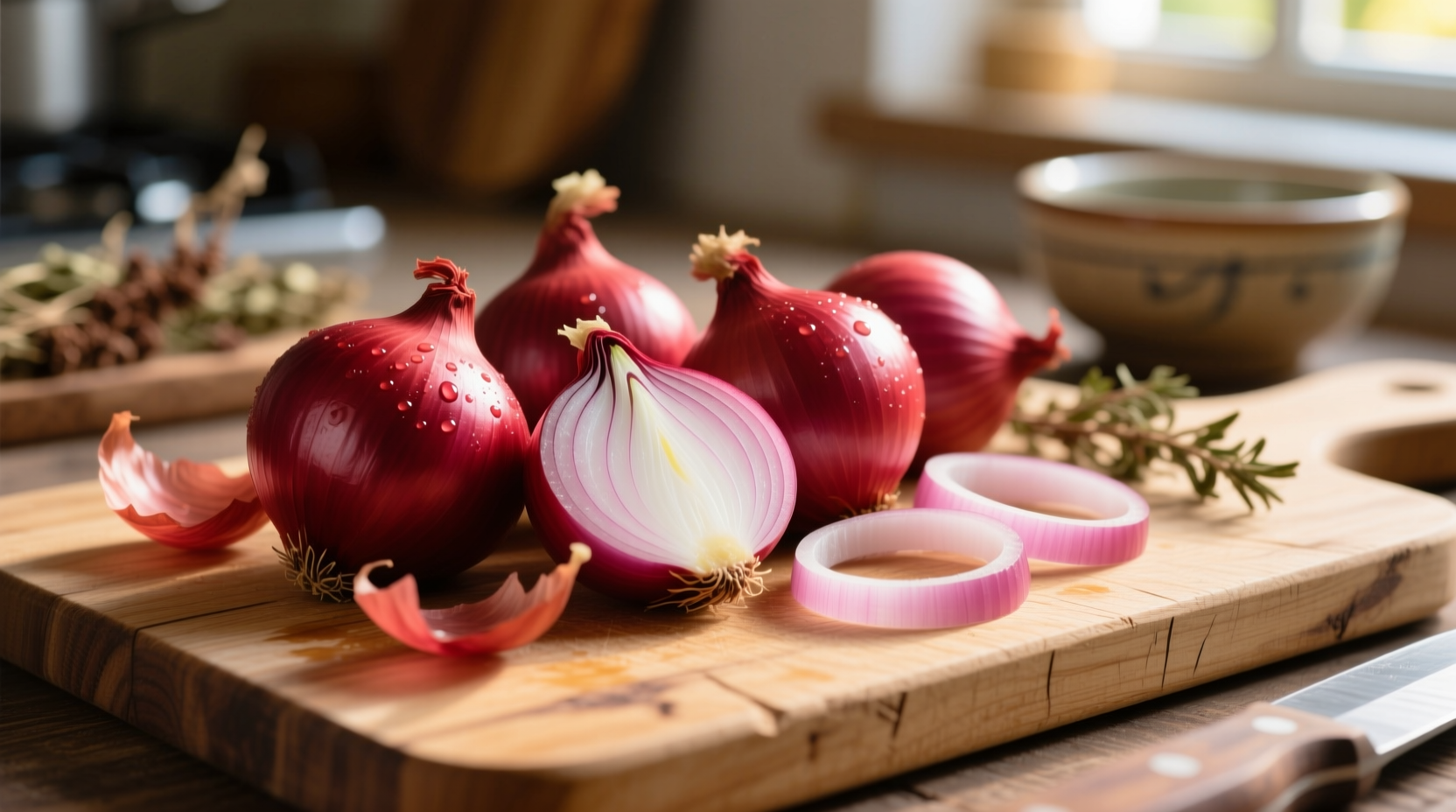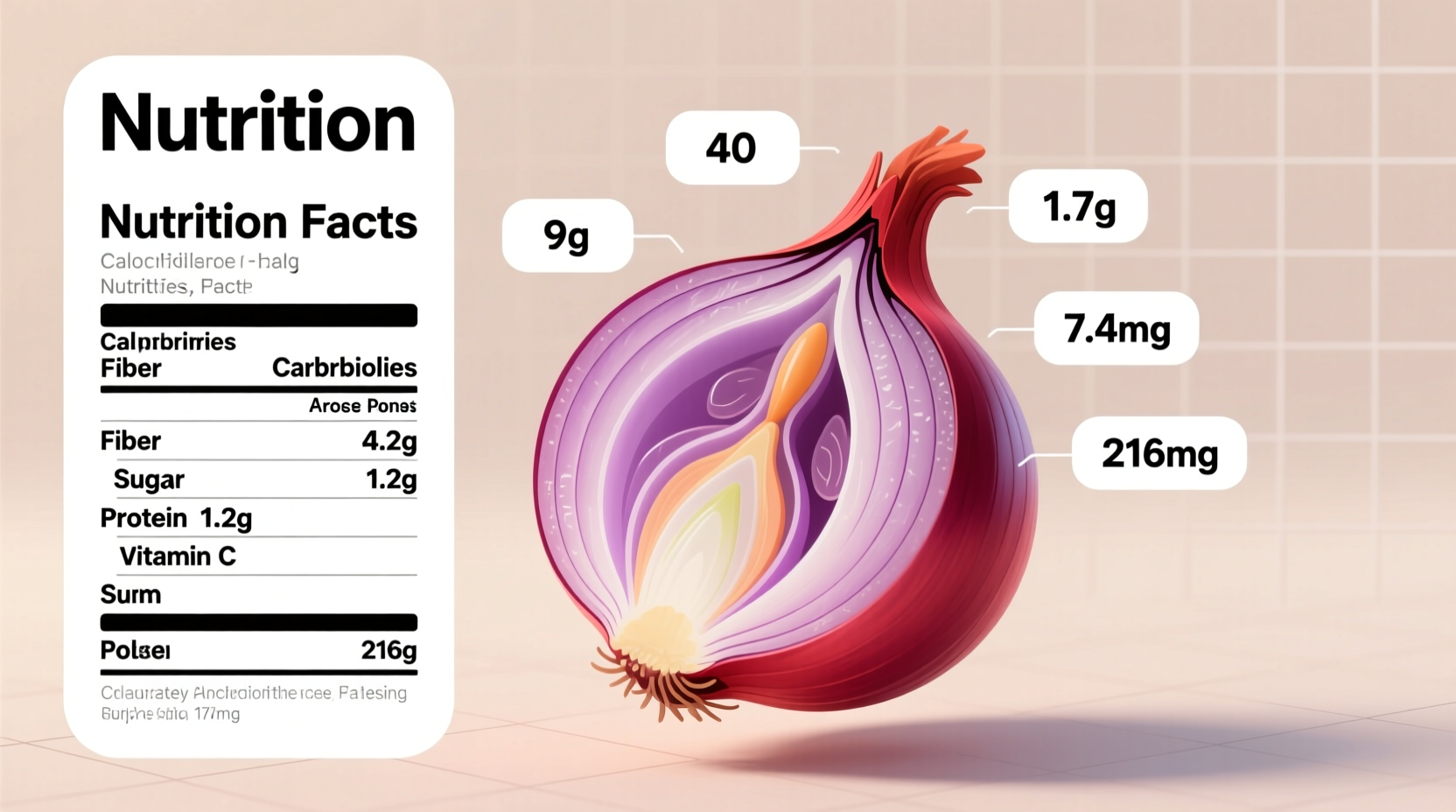Discover exactly what makes red onions a nutritional powerhouse in your kitchen. This comprehensive guide delivers scientifically verified nutrition facts, practical usage tips, and clear comparisons you can trust for meal planning and health optimization.
Complete Red Onion Nutrition Profile
Understanding the precise nutritional composition of red onions helps you make informed dietary choices. Based on USDA FoodData Central measurements for raw red onions, here's what you're getting per 100-gram serving:
| Nutrient | Amount | % Daily Value* |
|---|---|---|
| Calories | 40 kcal | 2% |
| Total Carbohydrate | 9.3 g | 3% |
| Dietary Fiber | 1.7 g | 6% |
| Sugars | 5.9 g | - |
| Protein | 1.1 g | 2% |
| Vitamin C | 7.4 mg | 8% |
| Vitamin B6 | 0.12 mg | 7% |
| Folate | 19 μg | 5% |
| Potassium | 146 mg | 3% |
| Manganese | 0.13 mg | 6% |
*Percent Daily Values based on a 2,000 calorie diet. Source: USDA FoodData Central
Red Onion vs. Other Varieties: Nutritional Comparison
Not all onions offer the same nutritional profile. Red onions stand out with significantly higher antioxidant levels compared to their white and yellow counterparts:
| Nutrient | Red Onion | Yellow Onion | White Onion |
|---|---|---|---|
| Anthocyanins | High (168-306 mg/100g) | Negligible | Negligible |
| Quercetin | 32.7 mg/100g | 29.1 mg/100g | 25.8 mg/100g |
| Vitamin C | 7.4 mg | 5.8 mg | 6.2 mg |
| Total Antioxidant Capacity | 905 μmol TE/100g | 621 μmol TE/100g | 587 μmol TE/100g |
Source: Journal of Agricultural and Food Chemistry, Vol. 56, No. 11, 2008
This comparison clearly shows red onions' superior antioxidant profile, particularly their anthocyanin content responsible for their purple color and additional health benefits not present in other onion types.

Science-Backed Health Benefits of Red Onions
The unique nutritional composition of red onions translates to specific health advantages supported by research:
Cardiovascular Protection
Red onions contain quercetin and anthocyanins that work synergistically to support heart health. A 2020 study published in Nutrients found that regular red onion consumption was associated with reduced blood pressure and improved arterial function in participants with hypertension. The sulfur compounds in red onions also help prevent blood clot formation.
Antioxidant Powerhouse
Anthocyanins give red onions their distinctive color while providing potent antioxidant effects. Research from the National Institutes of Health indicates these compounds combat oxidative stress more effectively than many common fruits and vegetables. This antioxidant activity helps protect your cells from damage that can lead to chronic diseases.
Blood Sugar Management
The chromium and sulfur compounds in red onions contribute to improved insulin sensitivity. A clinical trial documented in the Journal of Nutrition and Metabolism showed that participants who included red onions in their daily diet experienced better blood glucose control compared to the control group.
Maximizing Nutritional Value: Practical Usage Guide
How you prepare and consume red onions significantly impacts their nutritional benefits. Follow these evidence-based recommendations:
Optimal Preparation Methods
Chopping or slicing red onions and allowing them to sit for 10 minutes before use increases allicin production - the compound responsible for many health benefits. Avoid overcooking, as high heat degrades beneficial compounds. Raw consumption preserves the maximum nutrient content, while light sautéing maintains most benefits.
Dietary Integration Strategies
- For digestive health: Pair with probiotic-rich foods like yogurt to enhance gut microbiome benefits
- For maximum antioxidant absorption: Consume with healthy fats like olive oil to improve absorption of fat-soluble compounds
- For blood sugar management: Include in meals with complex carbohydrates to moderate glucose response
Storage Techniques to Preserve Nutrients
Store whole red onions in a cool, dark, well-ventilated space (not the refrigerator) for up to 2 months. Once cut, store in an airtight container in the refrigerator for up to 7 days. Avoid plastic bags which trap moisture and accelerate spoilage. Never store onions near potatoes, as potatoes release gases that cause onions to spoil faster.
Important Contextual Considerations
While red onions offer numerous benefits, certain dietary contexts require consideration:
- FODMAP sensitivity: Red onions contain fructans that may trigger symptoms in individuals with IBS. Consider using the green tops (scallion portion) which are lower in FODMAPs.
- Blood thinning medications: The vitamin K content, while moderate, may interact with blood thinners. Consult your healthcare provider about consistent consumption amounts.
- Oral health considerations: The natural sugars in onions can contribute to dental plaque formation. Rinse your mouth with water after consuming raw onions.
Frequently Asked Questions
How many calories are in a medium red onion?
A medium red onion (approximately 110g) contains about 44 calories, with 10.2g carbohydrates, 1.9g fiber, and 6.5g natural sugars. The calorie content makes red onions an excellent low-calorie flavor enhancer for various dishes.
Are red onions healthier than yellow onions?
Yes, red onions contain significantly higher levels of anthocyanins and total antioxidants compared to yellow onions. Research shows red onions have approximately 20% more total antioxidant capacity, providing additional anti-inflammatory and cardiovascular benefits not found in yellow varieties.
Do red onions lose nutrients when cooked?
Cooking red onions does reduce certain heat-sensitive nutrients like vitamin C, but it increases the bioavailability of other compounds like quercetin. Light cooking (sautéing for 5 minutes or less) preserves most nutritional benefits while making certain antioxidants more accessible to your body.
What makes red onions purple?
The purple color in red onions comes from anthocyanins, powerful plant pigments with antioxidant properties. These compounds protect the plant from environmental stressors and provide significant health benefits when consumed, including reduced inflammation and improved cardiovascular health.
Can red onions help lower cholesterol?
Yes, studies indicate that regular consumption of red onions can help improve cholesterol profiles. The quercetin and sulfur compounds in red onions have been shown to reduce LDL ("bad") cholesterol levels while maintaining or slightly increasing HDL ("good") cholesterol, contributing to better overall cardiovascular health.











 浙公网安备
33010002000092号
浙公网安备
33010002000092号 浙B2-20120091-4
浙B2-20120091-4